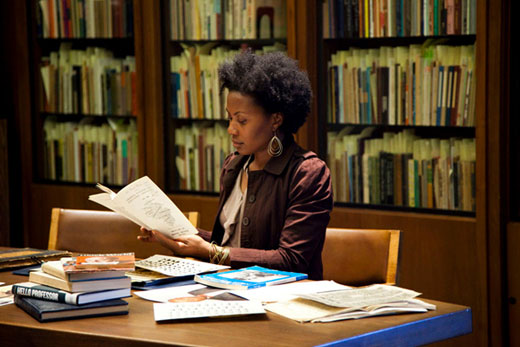After months of campus-wide dialogue, "Primary Evidence" has been selected as the focus for Emory's Quality Enhancement Plan (QEP), cited as a fundamental way to strengthen the central tenet of the University's intellectual life.
Selecting the topic was a critical university-wide effort for Emory as it prepares for a reaffirmation of accreditation review in 2014 by the Southern Association of Colleges and Schools (SACS).
The careful process of proposing and discussing topics culminated with town hall meetings earlier this year, where four final themes were presented: Primary Evidence, World View, Sustainability and Engaged Learning.
The QEP Selection Committee reviewed those proposed themes, along with substantial community feedback, before recommending a focus on Primary Evidence — a choice that has been accepted by the SACS leadership team, says Sarah McPhee, art history professor and co-chair of the QEP selection committee.
In choosing a QEP theme, the goal was to select a well-defined topic "that created a measureable and fundamental improvement in the nature of undergraduate education," McPhee says.
Though all the proposals were strong, Primary Evidence emerged as a foundational element of the liberal arts experience — an essential skill for helping students understand the groundwork that shapes original thought, explains Rick Rubinson, sociology professor and QEP selection committee co-chair.
"The strength of this topic is that it's able to engage and enhance part of the key mission, the goal of an undergraduate liberal arts education, which is trying to teach students how to really think and inquire about a problem," he says.
Students: A hunger for research
From scientific explorations in a campus lab to research with original documents in Emory's Manuscripts, Archives, and Rare Book Library (MARBL) or the investigation of artifacts at the Carlos Museum, the possibilities for applying the QEP to the Emory student experience are vast, says McPhee.
"Whether it's knowing how to negotiate a rare book or a sample from a stream, if the implementation of this plan goes as well as I think it could, a new model will evolve for an Emory education, a new set of goals and courses to embrace these ideas," she says.
While Emory faculty understand the value of research through primary evidence, McPhee says the theme aspires to help create those extraordinary moments of discovery for students, providing "that electrifying connection they hunger for."
At MARBL, evidence indicates a growing student demand for work with original documents. This academic year, 1,083 Emory undergraduates experienced research instruction through MARBL — a 43 percent increase over the last academic year, says Liz Chase, MARBL coordinator for research services.
Senior Vice Provost for Academic Affairs and SACS liaison Claire Sterk endorses the new QEP as one that impacts "the core of a liberal arts education," and "fits our broad perspective on student learning, including the importance of the student-faculty relationship."
"In addition, it builds on Emory's ongoing scholarship on teaching and learning … asking such questions as 'What is evidence? How does one weigh opposing evidence? How is evidence linked to critical thinking and analysis?' " she adds.
The potential of Primary Evidence
As a QEP focus, Primary Evidence could be "integrated across the curriculum, building from first-year seminars through general education requirements to capstone research and specialized courses," writes Associate Professor of Art History Bonna Wescoat, who drafted the proposal.
Courses could be enhanced by supporting "further firsthand encounters with primary evidence through performance, experiment, interview or the examination of original texts, manuscripts art works, historical documents, or fossils," Wescoat adds.
The QEP also "encourages us to examine how we choose to pursue primary evidence and the ethical consequences of these choices, in keeping with Emory's mission to make ethically informed contributions to learning," Wescoat explains.
"I think this will be a great advantage for our students, because they're eager to be players, keen to do research," she adds.
President James Wagner praises the QEP theme for "the way it aims to nurture the fundamental activities of academic life — examining things firsthand, questioning assertions of truth, going back to sources."
"In a society that has witnessed a rising flood of misinformation and half-truths, along with a decline in trust of our major institutions, wrestling with primary evidence has become a kind of civic imperative," Wagner says.
"It can instill the discernment and judgment necessary for engaged citizenship and self-governance," he adds.
With the QEP topic in hand, the focus now turns to developing a QEP implementation plan — a process expected to continue through next summer. The QEP will be submitted for SACS approval in December 2013.
The SACS Leadership Team, with guidance from the SACS Steering Committee, will next decide how that process will proceed and who will be involved.
Wescoat notes the QEP proposal was created with considerable campus input, including contributions from academic communities on both the Atlanta and Oxford campuses; the Woodruff Library; the Michael C. Carlos Museum; the Center for Ethics; the Fox Center for Humanistic Inquiry; the Scholarly Inquiry and Research at Emory (SIRE); the Office of Technology Services; the Office of the President; and University Marketing.
She also credits Pat Marsteller, director of the Emory College Center for Science Education; Keith Anthony, associate director of the Fox Center for Humanistic Inquiry; Rosemary Magee, vice president and secretary of the University; and Deborah Ayer, Writing Center director and English lecturer, for helping shape the proposal.

